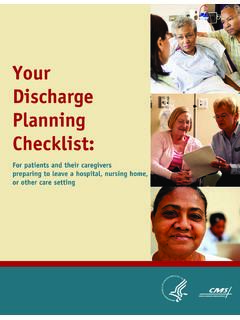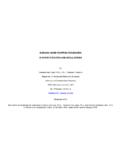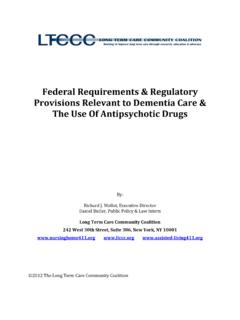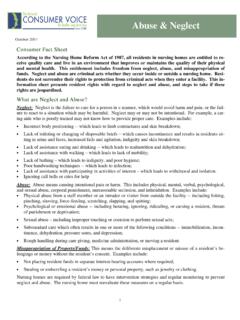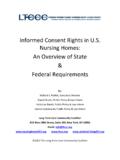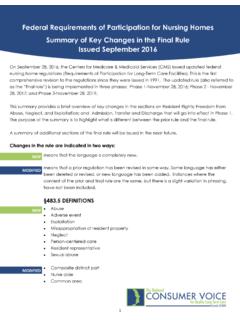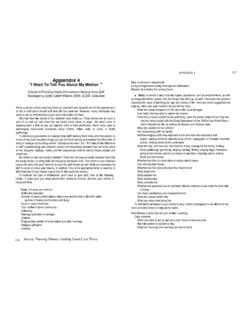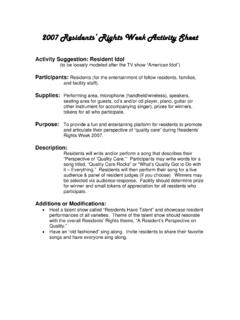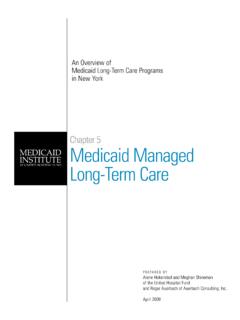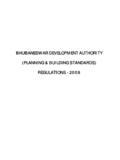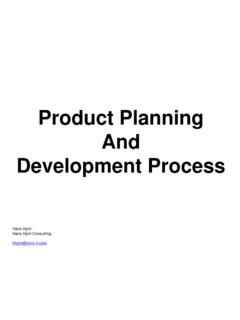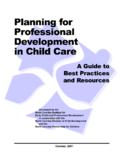Transcription of A Closer Look at the Revised Nursing Facility …
1 Justice in Aging ISSUE BRIEF 1 Executive SummaryRevised Nursing Facility regulations broadly affect Facility practices, including assessment care planning and discharge planning . The Revised assessment process places greater emphasis on a resident s preferences, goals, and life history. Regarding care planning , a Facility must develop and implement a baseline care plan within 48 hours of a resident s admission, with the comprehensive care plan to be developed subsequently. The care planning team has been expanded to require (among other things) participation by a nurse aide with responsibility for the resident, and the Facility must facilitate resident participation. care planning should include planning for discharge , and the Facility must document any determination that discharge to the community is not September 28, 2016, the Centers for Medicare & Medicaid Services (CMS) released Revised Nursing Facility regulations .
2 These regulations govern most aspects of Nursing Facility operations, and apply nationwide to any Nursing Facility that accepts Medicare and/or Medicaid assessment must be completed within 14 days of a resident s admission and, thereafter, after a significant change in the resident s condition, and at least annually. The assessment will continue to be performed through use of the Minimum Data Set form (MDS ). Assessments must include the resident s needs, strengths, goals, life history and preferences. 1 In addition, assessments should include observing and speaking with the resident, and speaking with direct care staff from all care PlansFor the first time, a Facility is required to develop and implement a baseline care plan within 48 hours of a resident s admission. This plan must set out initial goals for the resident, and include physician and dietary orders, plus any necessary therapy services or social services.
3 The Facility must give a summary of the plan to the resident and any resident 42 (b)(1).A Closer Look at the Revised Nursing Facility regulations assessment , care planning , and discharge planning AcknowledgementsJustice in Aging, National Consumer Voice for Quality Long-Term care , and Center for Medicare Advocacy created this issue brief in collaboration. This brief is the first of a series explaining important provisions of the Revised in Aging ISSUE BRIEF 2 Justice in Aging ISSUE BRIEF 3 The addition of a baseline care plan addresses a deficiency in the regulations previous version, which sometimes resulted in a resident being without a care plan for several weeks following care PlansThe care planning ProcessThe Facility must develop and implement a comprehensive, person-centered care plan for each resident within seven days of the initial assessment .
4 The term person-centered means that the resident, as much as possible, has control during care planning and in day-to-day care plan is prepared by a team that must include the attending physician and a registered nurse with responsibility for the resident, along with two persons added by the Revised regulations : a nurse aide with responsibility for the resident, and a member of the food and nutrition staff. Additional staff members participate as requested by the resident (or resident s representative), or if appropriate based on the resident s importantly, the resident and resident s representative participate in the care planning team, unless their participation would not be practicable. To ensure that a Nursing Facility does not exclude a resident or representative improperly, facilities are required to make a written explanation whenever participation by either is deemed not Plan ContentsThe comprehensive care plan must include objectives and timeframes for meeting all the resident s needs, so he or she can attain or maintain the highest practicable level of physical, mental, and psychosocial well-being.
5 The plan must indicate the services to be provided as well as needed services that the resident has refused. Also, in consultation with the resident and the resident s representative, the plan must include the resident s goals, and the resident s preference and potential for discharge . The Facility must document whether there has been an assessment of the resident s desire to move from the Facility into the community, and must note any referrals made to appropriate agencies to facilitate such a PlansIn a variety of ways, the Revised regulations emphasize the value of moving from a Nursing Facility back to the community whenever possible. As part of this emphasis, each Facility must develop and implement an effective discharge planning process. This process must focus on the resident s discharge goals and on reducing preventable , each resident must have a discharge plan, which is then included within the care plan.
6 The discharge plan must address the resident s goals of care and treatment regulations are somewhat vague in describing how to develop these plans. One provision directs that the care planning team must be involve[d] .. in the ongoing process of developing the discharge plan. 1 Another provision requires that the resident and representative be involve[d] in discharge plan development, and that the resident and representative be inform[ed] of the final resident must be asked about his or her interest in receiving information about moving from the Facility to the community. If the resident indicates an interest, the Facility should refer the resident to agencies that might provide assistance. Subsequently, any information from such agencies should be incorporated as appropriate into the care plan and discharge plan. If discharge to the community is determined to not be feasible, the Facility must list the reasons and the person(s) who made the determination.
7 1 42 (c)(1)(iii).2 42 (c)(1)(v).Justice in Aging ISSUE BRIEF 2 Justice in Aging ISSUE BRIEF 3 The resident should be re-evaluated regularly; as appropriate, the discharge plan should be modified to reflect changes in the resident s condition. Effective DatesThe Revised regulations assessment provisions are effective on November 28, 2016. Most care planning and discharge planning provisions will be effective on the same date, except for provisions relating to baseline care plans (11/28/2017) and trauma informed care (11/28/2019).Finding the RegulationsAssessments, care planning , and discharge planning are discussed primarily in sections (resident rights), ( assessment ), and ( care planning and discharge planning ) of Title 42 of the Code of Federal regulations . Tips for Residents and AdvocatesResidents and their advocates should welcome CMS increased emphasis on care planning and discharge planning .
8 The mere existence of the regulations , however, does not guarantee that these planning processes will operate in a person-centered way. Residents and their advocates should advocate forcefully for a strong voice in the planning process. Some facilities may be inclined to treat the planning regulations as a bothersome requirement, which makes it essential that residents effectively assert both their right to participate and their preferences for care and much as possible, the resident and representative should take the initiative. The resident s preferences and goals should be the foundation of any care plan or discharge is key. Prior to the care planning process, a resident should prepare a list of the assistance, activities or other preferences that he or she wants to be included in the care plan. Also, the resident or advocate should think of how those preferences should be explained or presented to the Nursing Facility staff.
9 Residents and their families likely will be unfamiliar with the care planning process, at least at first, so good preparation is an important way to ensure that the care planning process is properly focused on the resident s needs, goals, and planning for discharge , residents and their advocates should be vigilant to ensure that necessary services are in place when the resident moves from the Facility . The Facility shares responsibility for identifying and securing the assistance that the resident will need.
